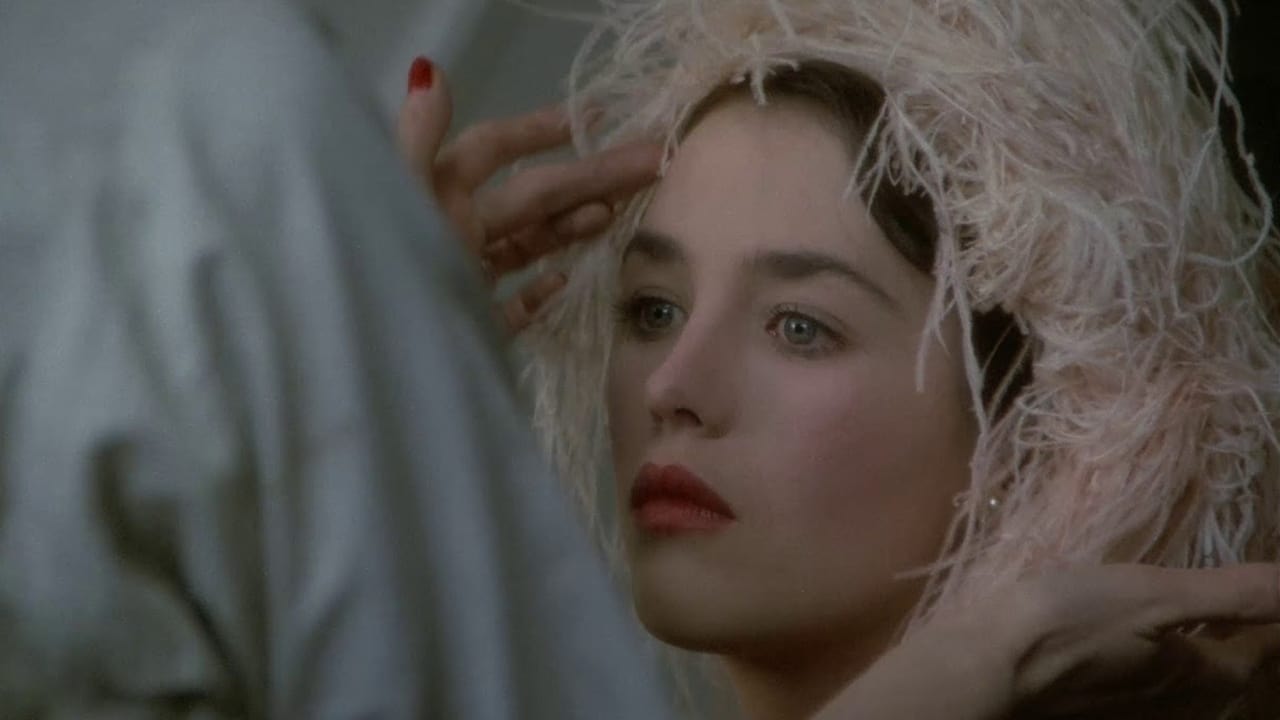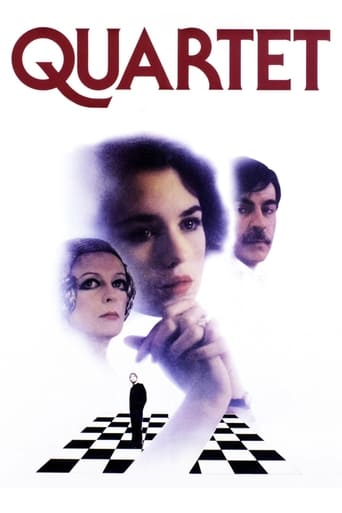

i know i wasted 90 mins of my life.
... View MoreA lot of fun.
... View MoreJust intense enough to provide a much-needed diversion, just lightweight enough to make you forget about it soon after it’s over. It’s not exactly “good,” per se, but it does what it sets out to do in terms of putting us on edge, which makes it … successful?
... View MoreThe film never slows down or bores, plunging from one harrowing sequence to the next.
... View More"Quartet" from 1981 takes place in Paris in 1927. Marya Zelli (Isabelle Adjani) and her husband Stephan (Anthony Higgins) in Paris and seem very much in love. One night, Marya and Stephan are in a club and Marya is summoned over to the table of the Heidlers, Lois and E.J. (Maggie Smith and Alan Bates). Lois is a painter and wants the stunning Marya to pose for her.Stephan is selling stolen art and is arrested and given a one-year sentence. Marya has no work visa. The Heidlers invite her to live in their spare room, which she does.It turns out that Heidler marriage isn't what it seems to the outside world. The reality is that Lois sort of procures pretty young women for her husband so that he'll stick around. Lois continues to visit Stephan in prison. But once released, he will have to leave Paris, and he will be broke. She's stuck -- she can't possibly be attracted to E.J., who is homely, but then again, it's either that or she lives on the street.This is a story we've seen before, as in Sister Carrie, where a woman in those days had very few options. It's actually based on a novel by Jean Rhys, which tells the story of her relationship with Ford Maddox Ford.Hard to believe this is a Merchant-Ivory film, but there it is. The film moves slowly, and at 1:45, it's too long and the people who made the picture knew it - we are treated to no less than three nightclub acts, and they're not short.The acting, of course, is fantastic, particularly from Maggie Smith, as a woman desperate to hold onto her husband at any cost. Why, we don't know, because they probably don't have much if any sex life. Alan Bates transforms himself into a homely, paunchy man and does an excellent job as a boring satyr.Until she destroyed her face with fillers and heaven knows what else, Isabelle Adjani was, by a mile, one of the most beautiful women in the world. It's hard to believe her character couldn't find some rich guy to marry and was settling for her unpleasant situation at the Heidlers. In the dresses of the period, she is exquisite. Her acting is excellent -- you can feel her frustration, depression, and acquiescence. Anthony Higgins has the smallest role but is very effective.The film turned out to be a flat experience. It's a shame because such talent could have been involved in a much more involving story.
... View More"Quartet" was nothing more than just "Sad Café" with Redgrave replaced by Maggie Smith. Sure, the stories are different, but Smith carried this film throughout the hour and forty minutes, I watched just her, apathetic towards anyone else. The music was dull, the scenery was again beautiful but teetered on repetitious, and our story was non-existent. Cheating socialites art thieves wives attempting to keep control the elements were all in place, but M&I could not carry the raw emotion to this film. "Quartet", simply put, was downgraded to a miserable solo.Merchant & Ivory did a great job in showing us Paris, 1920, both physically and emotionally. Having watched other films trying to capture the feel and vision of this era, they went above and beyond by handing us scenes in apartments, lounges, and those eccentric party scenes. The detail towards both the locations and the costumes were amazing, especially for Maggie Smith who seemed perfect in her imagined time and place. There was even this great scene that demonstrated the sexual consensus during this era. As this is a film about the honesty of love, it fit well into the dual-emotions being felt by both Smith and Adjani (the woman who moves into Smith and Bates' relationship). Ivory, directing this film, has done a phenomenal job of building the imagery, such as the places, events, and material feel for "Quartet", and he even does a great job in giving us the symbolism of the characters. Smith, playing the dedicated wife to her husband, HJ (played by Alan Bates), is eerily similar to the youthful Adjani - seemingly unable to say no to the forceful advances of Bates. Ivory gives us this rare glimpse to see what a youthful Smith may have been experiencing when she first met Bates, and why she allows this destructive ménage a trios. Coupled with the other sexual parodies throughout, Ivory has captured his desired emotions, but where "Quartet" fails is that he doesn't know what to do with them.So, our scenes are set up beautifully. The underlining meaning behind our characters is also in place (giving graduate students something to talk about), but exactly does this film fail. "Quartet" never reaches the level of "Sad Café" because outside of Maggie Smith, none of our characters are worth their price. A maniacal combination of over-the-top acting and horrid editing, one would nearly need to watch "Quartet" four times before fully seeing the central characters come to life. This was a difficult film to follow, because our leads were impossible to stand behind, and our story seemed rushed and never quite developed. Sure, we had great visuals to accompany them, but it wasn't enough. I never thought I knew the pressures of Adjani throughout the entire film the anger of Bates seemed to come from left field (not enough development), and Adjani's husband could have been a cardboard cut-out and still be able to get the job done. Due to the sub-par acting, Maggie Smith was able to chomp down hard and demonstrate a full range of abilities. "Quartet" is worth watching merely for Smith, but the rest will leave you bored. It fails because Ivory has created a film with the minority in mind.This is not a film for everyone, and having seen several slow-moving British films, it wasn't even right for me. Ivory seems to be lacking a universal message, something that one could escape from the film with. Something that, in a group of friends, one could say "But I did like this part because " For "Quartet" it wasn't there. Perhaps it was the translation from Jean Rhys' novel. Not everything can be translated from the printed page, and where you could read a scene as less subtle, Ivory went hysterical. There were just these moments, especially near the end, where instead of coming to a conclusion, Ivory instituted anger, rage, and screaming. It just didn't work. It didn't fit these under-developed characters. My major issue with this film is that events took place that didn't fit our actors. We were subjugated to watch them do things in this film that I do not believe they would actually do our character's actions seemed to negate their voice.Overall, "Quartet" stimulated my visual senses, demonstrated the power of Maggie Smith, and slipped some symbolic messages deep within the sub-text of the film, but on every other level it failed. Again, Smith proved that even playing a secondary character, she could take the role, give us those emotion-filled eyes, and steal away every scene possible. Even when she wasn't on screen, we couldn't help but wonder what she was doing. Ivory, as director, cannot seem to control the story. His failure comes with the horrid translation of Rhys' work. They chose to replace emotion with rage, which transformed the story's irony of love into confusing connections. Paris, 1920s, was beautiful. He hit his stride very well with our location, but the rest of the film flopped like a suffocating fish. "Quartet" is a very dry film due mainly in part to our disastrous actors unable to life and the doldrums the repeating score. It had quite a bit of potential, but never quite fulfilled any promises. Merchant & Ivory created a film that some will love, but missed their opportunity to appeal to greater masses. Not that this film had to be a blockbuster, by strengthening the characters as well as the story, Ivory could have had another solid cinematic experience. Instead, it fumbled causing the viewers to be the ones that suffered the most.Grade: ** ½ out of *****
... View MoreAbandoned in Paris with no work permit and no savings, when her art-dealing (illegal) Polish husband is sent to prison, Marya Zelli (Isabelle Adjani) accepts the hospitality of the Heidlers, Lois and H.J.(as Lois invariably calls him) which, probably inevitably, involves her providing bed service to H.J. The video box describes the Heidlers as a "freethinking British couple" - if you can accept a couple, with such limited self-awareness and inability to talk through their problems, as freethinkers. The film is based on the novel by Jean Rhys, based on her own experiences with Ford Madox Ford who presumably had more going for him than H.J., or else he wouldn't be in all those books on the literature of the twenties. Apparently Ford helped Rhys with her novel, and after he tired of her body got her a ghost-writing job on the Riviera. Rhys' husband was out of prison and had abandoned her before she moved in with the Fords. Presumably her major motivation was her devotion to her writing. Marya Zelli, in the film is not a writer, and she stays in Paris because her husband is still in prison. She says more than once to Lois that if given 100 Fr she would disappear (back to England where she could legally work?) but she gets 250 Fr just before moving in with the Heidlers when she sells almost everything she has to the hotel concierge.Thus while the film is of the desperation of no choice, Marya has in fact fewer options than the real-life Rhys, and the film ending where Marya is thrown on the mercy of her husband's acquaintance from prison, is very bleak, unlike Rhys' fate of being ejected to a writing job.
... View MoreThat this was seen on a first visit to Paris at the Pathe Hautefeuille in the 6th may color the memory, but there it is. The sad Woolcott figure played by Bates is desperate (as is his Maggie Smith [BRILLIANT!] wife, a sad and cynical lady) and has an eye for new flesh. (This is pure Noel Harrison (Rex's boy) "new flesh to carve," as in his Young Girl cut.) The Woolcottioan figure is paunchy, unattractive, hungry, but with some social clout, and skincrawling. Maggie's character aids and abets. What's her line? One wonders if the satyr is in fact impotent. Cinematography, music, story line, cast...over reasonable expectations. Desperate story from a sad and deserate writer, Rhys, a suicide, I seem to recall. Ivory did this? Harder than the usual soft stuff the boyos do. Wondeful. Buy it.
... View More